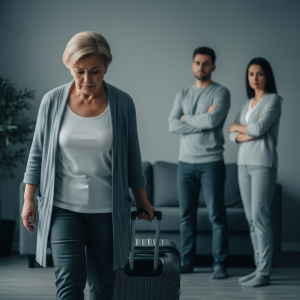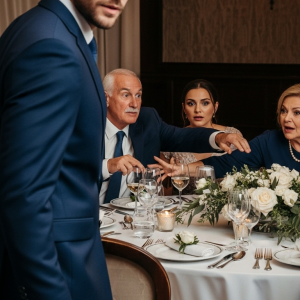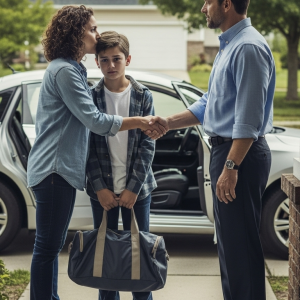My name is Eleanor Grace Whitmore. I’m 68 years old. For nearly five decades, I was a wife, a mother, and the quiet heart of Hazelbrook Orchards. Three weeks ago, I buried my husband, Richard. We built everything together—this orchard, this home, this family. I had hoped grief would bring our children back to us, but when they arrived for the funeral, I didn’t see children mourning their father. I saw professionals calculating an estate.
Richard died of pancreatic cancer. He didn’t want the kids to know how bad it was. “Let them live their lives a little longer without the shadow,” he’d whispered. I agreed, but in truth, our children, Darren and Samantha, had grown distant long before the diagnosis. Darren, a high-flyer in Boston’s financial world, hadn’t been home for more than a weekend in years. Samantha drifted from one failed wellness business to another, always funded by Richard’s savings.
The morning after the funeral, they came downstairs dressed for a business meeting, not a family breakfast. “Mom,” Darren began, his tone crisp and efficient. “We’ve been talking. We think it’s time to start settling things. The estate, the business, the house.” Samantha chimed in, her voice smooth as a sales pitch. “We want you to be comfortable. There’s a wonderful retirement community two hours south, Sunnyvale Estates. Activities, friends your age…” “The house is too much for someone your age,” Darren added. My age. I, who had pruned these trees beside Richard through blizzards and heat waves, handled payroll, and driven tractors. I was suddenly too old.
Then Darren pulled out a folder, its contents printed on his corporate letterhead. “Dad spoke to me about this last year,” he said, sliding a document toward me. “He wanted Melissa and me to take over.” I looked at the paper. Richard’s signature was there, but it was too steady, too perfect. He hadn’t written that clearly in months, not since the morphine began. “This isn’t from our family lawyer,” I said quietly. “He was lucid when he signed it,” Darren insisted. Samantha jumped in. “There’s a developer interested. Seven million for the land. We’d be set. You’d be cared for.” A developer. They wanted to level the orchard, to replace a lifetime of harvests with concrete and cul-de-sacs. “You’re talking about selling your father’s life’s work,” I said, my voice barely a whisper. “Mom, be reasonable,” Darren said. “The orchard can’t last forever.” A slow, burning fury rose in me. I looked at my children, these strangers in my kitchen, and said with calm steadiness, “Show me the will.” Darren pushed the folder forward again. I didn’t touch it. “I’m going to bed,” I said. “We’ll talk tomorrow.” But I already knew. There would be no tomorrow conversation. They weren’t grieving. They were executing a plan.
I didn’t sleep. I lay awake in the bed I had shared with Richard for decades, listening to the familiar creeks of the farmhouse. By morning, the house smelled of Darren’s sharp, imported coffee. They were waiting for me downstairs, coats on, with a small suitcase packed. It wasn’t mine. “We packed some essentials for you,” Samantha said brightly. “We thought we could drive you to Sunnyvale today. Just to look.” “I’m not going to a retirement community,” I said. Darren checked his watch. “Mom, the paperwork is done. We close with the developers next week. You can’t stay here.” “This is my home.” “It’s all of ours,” he said flatly. “Dad left the business to us. It’s time you let go.”
I saw him then, not as the boy who once chased bees through the orchard, but as a man who viewed his own mother as a liability to be managed. To avoid a fight I couldn’t win, I feigned compliance. “I need my medication,” I said. “And I’d like to grab some family photos.” “Take whatever you want,” Samantha said, visibly relieved. “We’ll ship the rest.”
Upstairs, I gathered my pills. But I also retrieved something they never knew existed. From a fireproof box hidden behind Richard’s old flannel shirts, I took a folded document: the original deed to twenty acres of land, purchased in my maiden name before I ever married Richard. Land with the only natural water source on the entire property. Land essential to any future development.
I let them lead me to the car, let them believe I was defeated. We drove past the fields, past the town library, past the landmarks of my life. But instead of turning toward the highway, Darren veered onto a remote county road. Twenty minutes later, he pulled over onto a gravel shoulder beside an empty field. He turned to me, his face impassive. “This is where you get off, Mom,” he said, as casually as if he were announcing a stoplight. “The house and business are ours now. This is cleaner.” Samantha’s smile faltered. “Darren, what are you—?” “She’ll contest the will, make scenes,” he cut her off. “She has clothes, her meds. There’s a gas station five miles up.” He opened my door. And just like that, they drove away, leaving me in a cloud of dust and betrayal. I stood still, clutching the small suitcase they had packed for me. I wasn’t afraid. I wasn’t broken. I was free. And in my purse, I held the one thing they forgot to value: the truth.
I began to walk, not toward the gas station, but toward town, toward my next move. After nearly two hours, I reached Miller’s Gas and Grocery. Ray Miller, who had known me for thirty years, saw me sitting on the bench outside, his brow furrowed with concern. “Mrs. Whitmore? You all right?” “Just resting, Ray,” I said. His simple kindness nearly undid me, but I held my composure. “May I use your phone?”
He led me to a small office in the back. I dialed the number from memory. “Harold Jennings,” our family lawyer answered. “Eleanor! I’ve been trying to reach you. I expected you at the will reading.” “What reading, Harold?” There was a pause. “Darren presented a will. I had my concerns. It didn’t match the file your husband and I updated last year.” “I need your help,” I said, my voice clear and strong. “And your discretion.” “You have both. My office. One hour.”
Harold Jennings was the kind of man who wore sweater vests without irony and still believed in handshakes. He met me at his office door, his expression grim. “Tell me everything,” he said. So I did. The fake will, the kitchen confrontation, the roadside abandonment. When I finished, I placed the fireproof box on his desk and pulled out the original deed. Harold examined it with a reverent silence. “This… this is gold, Eleanor. This isn’t just land. This is leverage. With the water rights, the developer can’t touch anything without this.” “I know.” “The will Darren submitted is a forgery,” Harold stated. “I knew it. The signature was too clean for a man under hospice care. We’ll challenge it, but that takes time. Meanwhile, we use this.” He held up the deed. “I want my home back,” I said quietly. “And I want them to understand what they’ve done.” “Then we’ll make them understand,” he promised. “Starting now.”
By noon the next day, Harold had filed an emergency injunction to freeze any transfer of ownership of Hazelbrook Orchards. A courier delivered the notice to the development firm. Within hours, their lawyers were calling Harold, demanding clarification. “I told them the truth,” Harold said to me later. “The land is incomplete. The water rights are not transferable. And your children do not have the authority they claim.” The seven-million-dollar deal was suspended indefinitely.
That evening, a text message arrived on the prepaid phone I’d bought. It was Samantha. “Mom, please call me. We need to talk. Darren’s freaking out. We didn’t know about that other land. Can we just fix this?” Fix this. I stared at the words. There was no apology, no remorse. Just panic now that the money was slipping through their fingers. I didn’t reply.
Later that night, Darren called Harold directly, blustering and demanding, but Harold calmly informed him that all communication would now go through legal channels. “They’re realizing they miscalculated badly,” Harold told me. “They thought I had nothing left,” I replied. “But I had everything they forgot to value.” I lived too long with kindness in my bones to become bitter now. But I would not be silent either. The orchard Richard built was not a commodity. It was home, and I was not done protecting it.
In the weeks that followed, I rented a modest apartment above the bakery on Main Street. It smelled of cinnamon in the mornings. It wasn’t the home Richard and I built, but it was mine, and that mattered. I started teaching quilting again at the community center. I held workshops at the library on organic gardening.
The orchard remained untouched, blooming as it always did in spring. I heard whispers that the developer had pulled out entirely, that the forged will was under formal investigation, and that Darren and Samantha’s reputations had taken a severe hit. Darren’s firm in Boston, a place that valued the appearance of integrity, was not pleased. Samantha’s latest wellness venture collapsed without its expected funding.
I made a decision. I donated the water rights from my twenty acres to the Hazelbrook Agricultural Cooperative, a local initiative supporting young farmers. The land would be used, not sold. The trees would be cared for. That was the future I wanted, a legacy of growth, not greed.
I often think back to that moment on the gravel road, standing alone with a suitcase I didn’t pack. It should have broken me. But it didn’t. Because in that silence, I finally heard a truth I had ignored for years. Being a mother does not mean tolerating betrayal. My children believed they could erase me because I was older, grieving, and alone. But they forgot something. Before I was a wife or a mother, I was Eleanor Grace, a woman who built something with her hands and her heart. What they saw as weakness—my silence, my trust, my love—was the very power that protected me.
My orchard still stands. My name is still on the deed. And my life… it’s mine again.
The apartment above the bakery smelled of cinnamon each morning, a gentle sweetness that crept into my dreams and woke me with something I hadn’t felt in months: peace. The walls were small, the ceilings low, but it was mine. I kept a quilt draped over the old rocking chair, and every evening, I’d sit by the window with a pot of tea, looking down at Main Street as the lamps flickered on. For the first time since Richard passed, the silence didn’t ache—it healed.
Hazelbrook is the kind of town where nothing stays secret long, and my children’s betrayal had stirred whispers like wind in the orchard. People stopped me on the street—some with sympathy, others with curiosity. But most with quiet solidarity. They had seen Darren’s arrogance at the funeral, Samantha’s polished but hollow charm. They knew, even without words.
At the library, I started running small gardening workshops again. Teenagers who had once rolled their eyes at farm talk now listened intently as I showed them how to graft a branch or mix compost. “Mrs. Whitmore,” one boy asked shyly, “are you going to sell the orchard?” I smiled. “The orchard is part of this town. It isn’t mine to sell. It belongs to anyone who still believes in the soil.” His eyes lit up, and in that moment, I knew Richard would have been proud.
Meanwhile, Darren and Samantha were unraveling. Harold kept me updated in his precise, lawyerly way. The forged will was now under active investigation by the probate court. A handwriting expert had been brought in. Darren’s colleagues in Boston whispered about “ethical concerns.” Samantha’s wellness investors pulled out once rumors of fraud reached them.
But none of that brought me satisfaction. What I felt was steadier, quieter: justice moving at its own slow pace.
Until one evening, just after dusk, I heard a knock on my bakery-apartment door.
When I opened it, Samantha stood there. Her perfect hair was disheveled, her eyes rimmed red. “Mom, please. Can I come in?”
I hesitated, then stepped aside. She sank into the rocking chair, wringing her hands.
“Darren’s in trouble,” she blurted. “The investigators… the firm might drop him. He’s furious. He says you set him up. Mom, I didn’t know about the will—he handled that. I just thought—”
I raised a hand. “Stop. You both thought you could take what you hadn’t earned.”
Tears spilled down her cheeks. “I didn’t mean for it to go this far. I just… I wanted security.”
“Security doesn’t come from betrayal, Samantha.”
She looked up at me then, truly looked, as though seeing her mother not as an obstacle but as a woman with her own edges. “Can’t you forgive us? Just… make this go away?”
I sat across from her, folding my hands. “Forgiveness and forgetting are not the same. I can forgive you someday, perhaps. But I will not erase what you’ve done. And I will not give you the orchard.”
Her sob turned into a harsh laugh. “So you’ll die alone in some tiny apartment while the land rots?”
I leaned forward, my voice calm but sharp as the pruning shears I’d used for decades. “No, Samantha. I’ll live surrounded by people who value honesty. And the orchard will bloom long after your schemes have crumbled.”
She flinched, stood, and left without another word.
Two weeks later, a notice appeared on the town bulletin board: a public meeting to discuss the future of Hazelbrook Orchards. Rumor had it the developer’s lawyers were sending representatives, and Darren was coming to defend himself.
The night of the meeting, the town hall was packed. Farmers in work boots, bakers with flour still dusting their aprons, teenagers whispering at the back. I sat in the front row, my back straight, Harold at my side.
Darren strode to the podium in a sleek suit, his voice smooth, rehearsed. “Ladies and gentlemen, I know there’s been confusion. But progress is inevitable. Hazelbrook Orchards has run its course. Development brings jobs, revenue, growth. My father wanted this.”
Murmurs rippled through the crowd. Then Harold rose, holding up the deed I had protected all these years. “Correction. Mr. Whitmore could not have wanted this, because this land cannot be developed without Mrs. Whitmore’s consent. And she has donated the water rights to the Hazelbrook Agricultural Cooperative.”
Gasps. Applause. Darren’s face blanched. He tried to recover, his voice rising. “You can’t let one stubborn woman hold back an entire town!”
That’s when I stood. My voice was steady, carrying over the crowd. “This ‘stubborn woman’ worked these fields when you were still a boy with dirt on your knees. This orchard is not a commodity. It’s memory. It’s heritage. It’s the soil under our feet. And if you can look at all that and only see dollar signs, then maybe the problem isn’t the orchard. Maybe the problem is you.”
The hall erupted—not in anger, but in applause. Farmers stood. Shopkeepers nodded. Even the teenagers cheered. Darren’s face crumpled, his confidence finally cracking. He left without another word.
The weeks that followed sealed the matter. The court declared the forged will invalid. Darren faced a professional inquiry in Boston. Samantha disappeared from Hazelbrook, chasing some new scheme in another state.
And me? I returned to the orchard. Not to live in the big farmhouse—I left that empty, a monument to Richard. But I walked its rows, touched the bark of the apple trees, and whispered to them as though to old friends.
The cooperative began planting new varieties, experimenting with sustainable techniques. Children came on field trips, their laughter ringing through the branches. I watched them, heart full, knowing the orchard’s legacy was safe.
At night, I still returned to my bakery apartment, warm with the smell of cinnamon and yeast. I quilted. I taught. I lived.
And sometimes, in the quiet just before dawn, I thought of Richard. I imagined him leaning against the old tractor, arms crossed, that half-smile on his face. “You did good, Ellie,” I could almost hear him say.
“I know,” I whispered back.
Because I had.
Not with fury or vengeance, but with quiet, unshakable strength.
Eleanor Grace Whitmore, widow, mother, survivor. Protector of Hazelbrook.
And, at last, free.




